Lisa Niver's Blog: We Said Go Travel, page 368
September 1, 2014
My tryst with independence in India
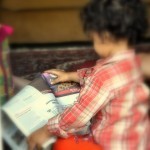
For as long as i can remember, I have been an independent soul. My father, a fiercely independent man himself, always tried to instill the sense of independence from when I was little. He would explain the small things in life that made us independent – read your own books – it’s the biggest joy in life – he would say, walk to the bus stand for the school bus yourself – learning to walk alone is the biggest lesson to learn – he would say, eat your food with your own hands – enjoying food with one’s own hands will make you taste every bit of the food – he would say, express yourself – your expressions make you the person you are going to be in the future – he would say, and make your own decisions – it’s the choices you make that shape the life you would lead – he would say.
So from early on, I had a deep understanding of being independent, and would enjoy establishing my sense of independence on my family. It wasn’t always appreciated by my mother who didn’t see these as good virtues of a woman – learn to be obedient she would say! But my father nurtured this streak of rebellious attitude – as some termed it as – and it grew.
But as i grew up and met new friends, i started to feel a sense of distance between them and me. I would come across friends who, while being just like me, did not know how to be independent. They did not know how to walk or talk or express themselves freely. They would look around a bit, be hesitant, and walk away from situations helpless. I would look at them and not be able to understand why. Was she different than me? Is she scared? Is she too vulnerable? I would ask myself. They would second guess themselves whenever faced with a choice as simple as “should i go for a movie instead of finishing my homework?” and there would be me who would make the choice as soon as it presented itself. Little did i know then that not everyone was allowed to make choices or taught even to make a choice at all? I just knew about my life and my choices…they were told they didn’t have a choice. And even when they were old enough, they always thought there weren’t many choices to be made after all. It was sad because it seemed unfair
When i was older, and got married, suddenly I was faced with the choice of either being independent or having to conform to certain rules laid out by my new family. I fought fiercely against the norms, at first, against the world of no choices, against the tradition to conform and found myself failing. Feeling restless i expressed myself against my new family with logic and sense. If i talked about it to father, he would ask me to choose between right and wrong and i knew he would expect me to choose the right. Knowing that however, I didn’t want to talk about it because while i was trying to fight, I was also choosing to stay amidst everything that i always thought was wrong. I was choosing because i didn’t want to stand alone. When had the fear of standing alone crept into my mind? I didn’t know. I was afraid to be myself. I was afraid to be alone and in all of this i was afraid to be independent. I was now one of my friends who were scared to make their own choices. I feared because i was afraid to lose, i feared to fly because i was afraid to fall. I had changed. At first i noticed the changes, later it seemed to make no difference.
Then one day five years back, i became a mother. I looked at my child who was all of 6 months defiant and fierce in her voice against everything that she didn’t seem to enjoy…new food, new nanny, new toys! I experienced a sense of freedom after a long time – a freedom i had completely kept aside – something that my little one was already beginning to show. I remembered my father’s words – the words of learning to walk alone, to read, to write, to express. I figured the time had come to instill the joy of freedom, of choice and of independence in my little one. I had lost mine for a while, but it was time to teach them to my daughter and hope that she would live with them a little longer than i did because as my father always said – a life without independence was a life that wasn’t your own.
Thank you for reading and commenting. Please enter the Independence Travel Writing competition and tell your story.
The post My tryst with independence in India appeared first on We Said Go Travel.
August 31, 2014
#TasteLA: Enjoying Field to Fork 2014
Thank you to the Los Angeles Times for inviting me to enjoy the Taste of Los Angeles 2014 as a member of the media. It is “A FOOD & WINE FESTIVAL THAT’S AUTHENTICALLY L.A.” I went to Field to Fork on Saturday morning which was hosted by Russ Parsons & Nancy Silverton. “Indulge in the bounty of California with an afternoon inspired by locally sourced ingredients and the pleasures of seasonal cooking. Leading L.A. chefs specializing in fresh-focused dishes will share their techniques and offer tastes.”
From Eveleigh: I enjoyed albacore tartine on homemade bread! I cannot wait to taste more treats from this restaurant and sit in their outdoor patio and enjoy the garden.
Looking to never say PLAIN VANILLA ICE CREAM again? Enjoy the single origin taste sensation that is Choctal. Their ice cream is like traveling the world through the flavors! Order online or find it at Bristol Farms and select Whole Foods.
At BOA Steakhouse — Beef: It’s what’s for dinner! I enjoyed fresh NY steak with summer squash and chipotle lime corn from Chef JR. He is fantastic! I cannot wait to eat a whole meal there!
The BLVD in the Beverly Wilshire is on the top of my list! I met a food writer at The Taste who told me her top selection of the day was the creations from BLVD! I really enjoyed the marinated skirt steak. It sat on a bed of Japanese soba noodles salad with artichokes and shiitake mushrooms.
Wondering how to choose what to eat at Chipotle Mexican Grill? I absolutely loved the barbacoa taco with guacamole and chili corn salsa! I was really impressed.
Ready for an organic beef patty on Broadway in Santa Monica? The Sweet Mona has hook’s cheddar, house made organic strawberry compote, Niman ranch smoked bacon, wood smoked caramelized onions!! Chef Makani made me a special one because I am allergic to strawberries and do not eat bacon. I loved my special aloha taste from Pono Burger!
What was your favorite at The Taste of Los Angeles?
Happy Eating! Lisa
The post #TasteLA: Enjoying Field to Fork 2014 appeared first on We Said Go Travel.
In Transit in Croatia
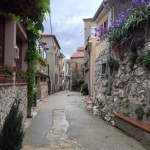
I’ve always loved liminal places – hotel rooms, airport terminals… The generic in-betweenness of them is non-threatening, like a closed door that excuses you from worrying, because you can’t see what’s on the other side. Those in-between places liberate you from commitment to before and after. They are a kind of purgatory, a space to work things out while reality waits in suspended animation. It’s in these places, and only these places, that I feel free. I carved out some breathing room for myself in the spring after I completed my undergrad degree. I’d planned and saved for The Gap Trip since my first minimum-wage salary, sometimes working three part-time jobs while going to university full-time. The route had been plotted and fantasized about two years prior to departure: a straight shot east around the world. Travel time: three months. Budget: Everything I had. Participants: Me, myself and I. In the days leading up to my solo stint around the globe, a long and brutal winter finally began to loosen its hold. Forgotten hues of blue and green softened the interminable shades of grey, mild temperatures massaged the tension out of hunched shoulders, and the world heaved a sigh of relief. That’s my cue, I thought. Of all the advice I got – both solicited and not (don’t carry all your cash in one place, take broad spectrum antibiotics, make photocopies of your passport and travel documents), the best by far was this: Don’t look back. This trip promised to be one of the most valuable experiences of my life, if only I got out of the way. Too often we miss what’s in front of us focusing on what’s not. Rolling my suitcase through the airport entrance alone, I felt the weight of what I’d done settle in my gut. Close on the heels of the sinking fear and loneliness, however, was a bolstering lift of freedom. As my plane galloped down the runway, I felt its wings catch the wind and I experienced a sense of weightlessness. We hit turbulence climbing through the cloud cover, and I gripped the armrests. When the ride levelled out, I realized the man in the seat next to mine was speaking to me. “It’s okay,” he nodded to my white knuckles. “You can let go now.” I glanced out the window. No matter how many times I fly, I’m always amazed by how clear the skies are above the clouds. A month later, I was spending my birthday in a four-star hotel room on a nosebleed-expensive wine tour in Croatia when it occurred to me that I never expected to get this far. Analyzing every expense, logistic and risk before leaving, I was certain I would crash and burn in the first week. These ancient places with their unrivalled scenery, extraordinary food and rich culture had been glimpses from the Travel Channel and Lonely Planet, static and flat. The actual sounds, textures and tastes were a reality I’d been afraid to imagine. I’d come to the Istrian Peninsula from the town of Rijeka, with whom I shared a birthday. They were celebrating their annual Freedom Festival when I left, in memory of the day they gained independence from Yugoslavia in 1991, which also happens to be the year I was born. Prior to arriving in Croatia via a harrowing series of trains, buses and border crossings, I’d visited Vatican City in Rome, as well as the Coliseum, Pantheon, Trevi Fountain and Spanish Steps. In Florence, I’d looked out over the Arno River from the Ponte Vecchio, listened to the bells of Giotto’s Campanile and stood before Botticelli’s original “Birth of Venus” in the Uffizi Gallery. After Croatia, I toured the Acropolis of Athens, explored Knossos Palace on Crete and saw the white-capped Aegean mirrored in the colours of Santorini. My journey culminated in a multi-day pack trip on horseback through the Andes to Machu Picchu. I met a lot of beautiful people, and spent a lot of time alone, exploring both the external and internal. When it was over, I knew the limits (or lack thereof) of my own capabilities. This was a tool that would make every step, every new venture, and every commitment a thousand times easier. I would not be returning to the fear and confusion of life as I left it. I’d been freed. Travel doesn’t change your life. It changes your ability to navigate it. I looked out the window on my flight home. Beyond the reflection of a girl I knew very well, the wing of the plane gleamed with the first morning light. I smiled, glad to be headed into the sunrise. Thank you for reading and commenting. Please enter the Independence Travel Writing competition and tell your story.
The post In Transit in Croatia appeared first on We Said Go Travel.
Rural Relaxation in Malawi
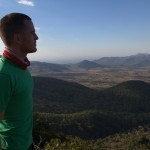
My bones creaked and my body yelped in pain as I rolled over and reached for my phone, but instead of the ghostly display satisfying my desire to know the exact hour at all times of day and night, I found only an inanimate piece of plastic. I then remembered, with the aid of the scratchy grass mat under me, that I was in Champiti, a rural village in central Malawi with no electricity, running water, or internet. I struggled to my feet, shrugged on a t-shirt and wandered outside. For everyone else it didn’t matter what the time was, the sun was rising so the day was beginning.
I stretched out the unfamiliar aches of sleeping on the floor and breathed in the untainted morning air. Gone was the frenetic hustle and bustle of the capital, the thick flavour of exhaust fumes, rotten produce, body odour and dried fish; the discordant melody of car horns, tinny music and people shouting their wares. Looking out I saw only a beautiful sunrise with rays piercing a growing cloud of dust as a little boy swept the dry ground, and heard only birds and the crackle of fire as breakfast was made. Now I felt free!
Most people travelling to Malawi head for the capital city, the magnificent Lake or a National Park, moving round in a gaggle of tourists pursued ceaselessly by locals wanting to sell their goods, or be your ‘best friend’. But most Malawians live a rural existence and it is here you experience the peace of simple living.
After breakfast we head out on the orange dirt paths through the village and into the hills. Unaccustomed to walking barefoot the small stones pinch, but the opportunity to really feel the earth makes me smile on through the pain and try to act like I am the same as my local friends. As we head up the Dzonzi peak the vista opens out and we can see small villages encased in rolling hills. Velvet monkeys crash through the trees and the tall grass pulsates with insects. We stop next to a pile of sticks and my friend Chisale explains that by adding a stick to this cairn you ensure that you will be fed on your return to the village. Not wanting to go hungry I eagerly throw on three. As we climb higher the lush vegetation makes the air cooler and the act of breathing feels like a detox. An overhanging rock crests the peak providing the perfect viewing platform. From here, looking out, the world seems at rest. It is strange to think that by removing yourself from ground level and being elevated to look down, the hive of activity that is life for humans and nature alike is concealed and replaced by a pace of movement more akin to a wind through the trees.
For me this is real relaxation, cut off from phones and social media, watching monkeys and birds in the trees, and listlessly wandering barefoot through the bush, now I feel like I’ve seen the real Malawi.
Thank you for reading and commenting. Please enter the Independence Travel Writing competition and tell your story.
The post Rural Relaxation in Malawi appeared first on We Said Go Travel.
August 30, 2014
On Motorbikes and Saviors in Thailand
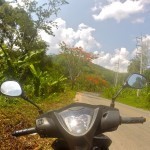
There are 762 curves on the highway between Chiang Mai and Pai, Thailand, according to the postcards and stickers plastering walls of tourist shops in the sleepy valley town. Minibuses service the area daily, but as every backpacker worth his baggy fisherman pants will tell you, the best way to enjoy these hills is on your own time. Motorbikes can be rented for dollars a day all over northern Thailand, and it takes nearly no time or skill to learn to drive one. A motorbike offers more autonomy, more freedom, fewer carsick neighbors, and fewer time constrictions.
Motorbikes also have fewer wheels, though. Two, to be exact, both of which are critically necessary for navigating the steep Route 1095, and around curve number 581, (or it may have been 495, or 613 – I kept a poor count), my number was cut abruptly in half. The back end of my bike fishtailed as the rhythmic slap of busted rubber on pavement overpowered the purr of my motor. I slowed to a shaky halt in the nook of a steep curve as my travel companion Nia pulled up behind me, speechless. We had met only days before, but we certainly were both stuck in this now.
“This is not the best place for this to happen,” I managed, eyebrows raised. We’d stopped directly in the line of traffic, hidden by the hills until the last moment. Then again, nowhere on this mountain was the best place for this to happen.
It wasn’t the worst, though, as I was soon to find out. As we looked at each other in shock, phoneless, clueless, and stranded, a hero was already descending down the hills. With khakis and a deep tan in place of a heavenly glow, I didn’t initially recognize my guardian angel, but these things tend to take you by surprise.
“No English!” he called to us, in English. We waved our hands dramatically and made “oh stop” faces, hoping to reassure him, pretending he was just being modest about his linguistic abilities. Now was not the time for self-conscious communication. To keep him from having to bridge the language gap alone, we dove into fierce pantomime, pointing wildly to the rubber strip that had once been a tire with ridiculous explosion gestures and pout-lipped shrugs. Standing up from his crouched position, the man attempted urgently and nonverbally to tell us what we had known since the fishtailing had begun moments earlier. He paid little attention to our theatrics, but he had landed on the theme of the narrative – there was no way this bike could carry me 50 more kilometers through the mountains.
“When you’re right, you’re right,” we tried to confirm with our expressions. “What a pickle we seemed to have landed in.”
“You go Pai?” he asked after a moment.
“Yes! Pai!”
We responded a little too loudly, eager to have landed on a word we all understood. “Pai!” the two of us continued to shout like lunatics, and “Pai!” the man would always respond, thinly mirroring our enthusiasm, the way a kind neighbor might respond to someone else’s baby learning a new word. We are all in agreement.
We might have been content to rejoice over our shared goals for a while longer, but my champion was a man of action. I was overtly appreciative and supremely unhelpful throughout the proceedings, but no matter – he didn’t need me at all. A quick lift and a whir of ropes later, I was squatting alongside my bike in the back of the truck, humming up the hills as steadily as I had been only twenty minutes before.
For all the hype given to the motorbike journey’s grand scenery, no one really champions the view from the bed of a stranger’s pickup truck. It has its downsides, of course – the seat above the wheel is jutted and tiny, and your muscles might cramp after hours of clutching an unsteady motor vehicle through endless curves. You no longer have the freedom to pull over at any coffee shop or waterfall that piques your interest. However, the pickup truck method is not without its charms. In exchange for your autonomy, you get gratitude. Trade in your misplaced faith in your own independence, and receive a deeper faith in humanity’s altruism and hospitality. If you’re looking for a healthy dose of gratitude and faith in humanity along with your adventure, I can’t recommend it more highly.
Thank you for reading and commenting. Please enter the Independence Travel Writing competition and tell your story.
The post On Motorbikes and Saviors in Thailand appeared first on We Said Go Travel.
Forgotten Thank Yous in India
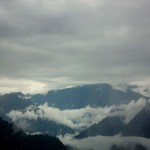
When you are travelling to the North-East of India, you expect to be feasting your eyes on the snowcapped mountains, the sun rise and the greenery. You expect to wrap yourself in a stole while drinking that hot cup of coffee, bang in the middle of the month of June. You expect to visit all the monasteries. You expect it to rain. But what you do not expect is being driven to a tiny street to a person’s house in a place which is a difficulty to spot on the map. Amidst the pouring rain. The ‘it’s-pouring-cats-and-dogs’ rain.
While visiting Pedong, a hill town on the West-Bengal-Sikkim border, I find myself in front of a house in the town of Aritar, a town overlooking the hills and the clouds nestled over it. it was a visit my Uncle said is a must-do. As I opened my big, fat umbrella under the pouring rain, I still wondered why. But before I could wonder any further, we were welcomed in the house by lots of beautiful, potted plants in the porch, and a very excited man. The man was about my height-5’3, salt-and-pepper hair and the biggest smile on his face. It was now that we understood that we were going to be visiting his house, which was not only home to his children and grandchildren, but also to treasures collected by two generations, and what these treasures were, we were soon to find out.
We walked into the house, led by the owner, and he ushered us into a tiny room; to the left he points out a range of bound notebooks, arranged like a series of any best-seller, which were his dad’s journals. Out of that room and into another-we find ourselves surrounded with the most unique driftwood I’ve ever come across-some growing out of stones, some hanging from the ceiling, some with stones of pastel colors. He told us how his dad and granddad started these collections, and how it gives him the utmost joy to protect and organize them. We walked in and out of the house-out to see his collection of bonsai. And what a collection it was. I was not minding the rain any more, for I was too engrossed looking at the miniature trees. And then I saw what I always wanted to see, at the corner of his shaky greenhouse- a pitcher plant. It was tinier, more colorful, and less vindictive than I imagined it to be. It isn’t how I expected it to be, but then neither was my day.
After we had walked through rooms showcasing all types of stamps, and currency, and error notes, which were by far my favorite (my brother and I challenged each other on finding what the error was), we walked through a room which exhibited old forms of electronics-from radios to watches to clocks. And on one of those many shelves, I found a shelf dedicated to cameras. Old film cameras, squeaky clean, still with a rusty kind of a shine. In the northern part of India, in a tiny, tiny town, in a cottage tucked inside narrow allies and streets, there lived a person who shared my interest. Photography. So many years ago, this camera must have given out such memories and smiley faces captured in its photographs. Someone must have held it, asked someone to pose once a while, and clicked the shutter button. And there, in rooms and rooms of history, I found myself a part of it.
How do you categorize this place? A museum? A store? A 24*7 exhibition? I would think of it as a time machine- the only place where I have seen the past and the present come together so harmoniously. A place which is independent in its own, has a sense of freedom, even with so much past attached to it. A house with lots of old stuff, how strange does that sound? But it doesn’t feel strange. You walk in, and everything, each bonsai in its pot, each coin in the framed wood box, each stamp in lamination, each driftwood in its place feels like it belongs. Like it has stayed here for years. Pun intended.
I wouldn’t have wanted the tour of his house to end, but I guess there is only so much a person and his dad can collect and keep as a hobby. Between the rain and having to cross the overflowing drains, I reached the car, leaving behind the man with the huge smile and his amazing treasures without a thank you, something which rightfully belonged to him, but was with me. But that’s okay. He has something that belonged to me too-a part of my self which rests with the camera, on the shelf of the tiny room which electronics, in a cottage tucked inside allies and streets, in a tiny town of Aritar, in Sikkim.
About the author: I am a undergraduate studying in New Delhi, India, and I share great love for dogs, travelling, writing, photography and ice cream.
The post Forgotten Thank Yous in India appeared first on We Said Go Travel.
August 29, 2014
Mountain Freedom in Australia

The only time I feel free is when I am alone.
But what does alone mean in this world? We can be on our own, yet our phone and computer lures us, tempting us with Facebook notifications, tweets, emails, and text messages.
Despite most people needing solo time to recharge, we’ve become addicted to company. It’s not necessarily the internet we’re addicted to – it’s being in constant contact with other human beings.
Are we that afraid of being alone?
Personally, too much human interaction suffocates me.
Even from the safety of behind a computer screen, too much contact feels like electronic shackles binding me to the world.
So, my only escape is being truly alone – away from people, away from electronics, and away from the internet.
There aren’t many places left that are unfettered by access to the internet.
And I’m on the search for one.
My destination is two hours drive out of Sydney, past suburban and then rural New South Wales in Australia. I’m bound for the Blue Mountains, a dissected plateau carved in sandstone bedrock. It’s part of the Great Dividing Range – the third longest land based range in the world.
I exit the highway and take the scenic route along Bell’s Line of Road. The drive up is as beautiful as the destination, passing the forests and valleys of the Hawkesbury and the Blue Mountains.
Arriving at Echo Point, I’m met with a vast expanse of greenery. The sandstone cliffs drop into dense bushland, and bushland slopes down into the expanse of the Megalong Valley. The sunlight refracts the oils in the native eucalyptus trees, changing the color of the leaves from green to blue.
The air is clear and unpolluted. The locals say the sky changes on a daily basis: one day it’s so foggy you can’t see 50 meters in front of you, the next it’s perfectly clear, perhaps a solitary cloud in the distance. When you breathe in, you smell the scent of fresh gum trees. I feel like every breath cleans my lungs.
The walk I’m taking starts at the Giant Stairway, descends more than 1,000 feet down to the valley, curves its way along the valley floor, and winds back up to the historic railway built in the 1880s for the coalmines.
The first section of the walk is a little challenging on the quads and calves. But my cell phone reception drops out quickly, which is what I’m after. And I’m grateful for my attire – sweatpants and a sweatshirt, with sneakers. Some polished looking Japanese tourists in heels are turning around, realizing this walk requires sturdier footwear.
After a throat-burning decline down the Giant Stairway (more than 800 steps, I’m told), it’s an easy walk along the valley floor.
The foliage changes where the high rainfall and sheltered gully heads have nurtured the wet forest. Tall, open Eucalyptus trees form an over story, and a sub-canopy of Blackwood trees provide shelter for the groundcover of grass and ferns.
Beams of sunlight filter through the canopies. It seems I’m at the right time of the day, midweek, to enjoy this bushwalk on my own.
I have three hours walking.
Three, glorious hours of unfettered alone time.
At first my mind wanders to trivial things. Songs I’m listening to on my phone, recent conversations I’ve had. I’m almost fearful to waste my alone time such unproductive nostalgia.
But, I calm my thoughts.
Exercise is not Zen meditation after all. The very act of being alone and letting my thoughts wander, no matter how trivial they seem, is relaxing in itself, and worth the time.
When I reach the end of the valley floor, and arrive at the historic scenic railway to take me on a steep incline back to the top of the mountain, I realize how quickly those few hours alone elapsed. And yet how far away they already seem.
As I hope back in my car, I’m already planning my next dose of freedom in the mountains.
About the Author: Jessica is a travel blogger, a writer, and a lawyer. She loves the Australian bush and any vacations involving the ocean.
Thank you for reading and commenting. Please enter the Independence Travel Writing competition and tell your story.
The post Mountain Freedom in Australia appeared first on We Said Go Travel.
Dancing Away the Sequins in Turkey

In many traditional Mediterranean and Middle Eastern cultures women are responsible for ensuring the honour of the family. Men’s passions are uncontrollable and wild, and all women are Eve, the temptress with the apple. He cannot help but succumb so a man is never held responsible for his sexual behaviour. The guilt is attributed the same way whether the partners are married to other people, not married to anyone, or even if the act is non-consensual. If a man and a woman are left alone in a room together, he won’t be able to help himself but the sin will belong to the woman alone.
Using the same line of reasoning, dancing, which brings men and women together and shows off the curves of the woman, is also considered suspect. Like many things in Turkey however, the rules of conduct are not that simple. One the one hand, dancing as a part of folk tradition is highly valued in Turkey, and being a good dancer is much admired. In more traditional parts of the country like Cappadocia, kına gecesi, the Turkish equivalent of a woman’s hen night, are used to showcase the allure and value of young women of marriageable age. At these nights only women attend, so those wishing to find a husband give it their all. They sway and preen and energetically thrust their hips from side-to-side and move their breasts provocatively in front of eagle-eyed potential mother-in-laws. Each move is assessed and judged to determine how supple they are, how well their body is equipped to procreate through the sex act and whether their hips are suitable for child-bearing.
On the other hand, these same movements make what we in the West call ‘belly dancing’ a scandalous past-time for a good Turkish girl. It is known locally as oriental dance, and I go to a class with my Turkish girlfriend Selin every week. We go because it’s fun and good for our figures, but Selin’s grandmother doesn’t understand this. She is scandalised that her granddaughter would do such a thing. When Selin reminds her that I go too, her grandmother dismissively replies that it is not the same. What she means is because I am a foreigner, a yabancı, the question of morality doesn’t apply. This is the complete opposite of the way Fatma in Göreme thought about my behaviour, but then she lived in a small village where everyone knew everyone, unlike in a city where you have a degree of anonymity. More significantly, it points to the fact that being a yabancı woman means you always live with contradictions. At times you are required to be more upstanding than the most moral of Turkish woman simply because you are foreign. At other times you are forgiven any indiscretions just because you are foreign. Living in Turkey is full of such ironies.
It is also ironic that the oriental style of dance is perceived as provocative and dangerously sensual by both Turks and Westerners. Just as being an actress was once equated with being a prostitute in the West, being a belly dancer in Turkey is considered no better than being a whore by some people. Older Turks strongly disapprove of oriental dance because it has connotations of wild abandonment, promise and seduction. These very connotations are what make the eyes of Western men glaze over with lust at the idea of scantily clad women offering themselves in a highly charged and sexual manner.
Yet the reality is very different. There is nothing wild and abandoned in their movements at all. The best oriental/belly dancers showcase immense muscle control, expressing complete stories in the flick of a wrist or the roll of their hips. A truly good performance is the result of hours of practice in stuffy, brightly lit rooms, in front of unforgiving mirrors that show every wrong step. In these rooms the lush shake of the hips becomes an overflow of misdirected and misbehaving excess fat. Sweat rolls down between breasts that are strapped into tight bras, breasts that are revolved left and then right, up and then down, in order to show control of a body that must learn to move as three distinct parts.
We spend a lot of our time vaguely embarrassed at the movements we are required to make, worriedly consulting with each other when we can’t remember the steps and anxiously hoping for a word of praise from our beautifully slender doe-eyed teacher who moves like an exotic butterfly. Beside her we feel like elephants. I guarantee that an hour spent watching my class learn new dance techniques would quell the worries of the most concerned grandmother, and the lust of almost any man.
About the author: Lisa Morrow has published an essay collection called Inside Out In Istanbul, writes a blog of the same name and has had articles published on Australia’s ABC Drum Media website. Both the Australian ABC and Austereo radio stations have interviewed her and she has a monthly spot on San Francisco Turkish Radio. She has recently released a new essay collection called Exploring Turkish Landscape and lives on the Asian side of Istanbul
Thank you for reading and commenting. Please enter the Independence Travel Writing competition and tell your story.
The post Dancing Away the Sequins in Turkey appeared first on We Said Go Travel.
August 28, 2014
From Relatives to Absolutes in India

From Relatives to Absolutes in India
Let me get straight to the point: leaving one’s home is an absolutely essential element in order to ‘feel free’. Let me get straight to another point: the above sentence makes a presumption that you already have a home. The context of home, independence and freedom is not absolute, but relative.
Now allow me to explain this sort-of-a-philosophical-treatise with a narrative of travel. I, along with my friend, Gyelek decided to travel from Delhi to Calcutta by a General ticket. Now there is hegemony in tickets too, with the least fare that takes you from Calcutta to Delhi make sure that the conditions of travel are beyond the means of comfort. No, I will not paint that typical picture of third world transport systems with trains having roaches scurrying all over the compartment, which by the way is an exaggeration but not uncommon. We found out that the Howrah-Kalka Mail stops at Sabzi-Mandi station before it halts for a longer time at the New Delhi Station and decided to board the train at the former, relatively empty station.
This, we thought, would give us the edge in finding some place in keeping our luggage and also a place to stick up our ass in some corner. This was December, and the chill of the sunless mornings in Delhi can make the bones shiver too. The auto ride from Lajpat Nagar to the station was not just chilly, but chilling, the wind our greatest adversary, hitting our cheekbones like a boxer’s jab. Of course, Gyelek is a Tibetan and grew up in the hills in Darjeeling, so it would be more appropriate if the collective pronoun ‘we’ in the previous statement is replaced by the personal pronoun ‘I’. Thus, our experience of travel, though a collective experience, was not a similar one: I being the more privileged of the two, proved to be more at a disadvantage by the very virtue of having the privilege of possessing a home, and living in a country where freedom was a constitutional right. The one saviour in this pricking chill would be a five rupee cup of piping hot tea that somehow seemed to possess medicinal value at this time of the year. So while we were enjoying our tea and observing the way a station too wakes up in the morning, not unlike a human, we nearly missed our train which had already arrived in another platform. We jumped off the platform and into the tracks to get into the train. We found a larger space beside the toilet in one of the compartments and were quite satisfied at the prospect of being able to stretch our legs. Travelling in this way too is illegal as we were in the Sleeper Class where only people with reserved seats can travel.
The Trained Ticket Examiners, commonly called TTs, wearing a black-and-white combination, come as guardians of the railway and fine squatters like us. Of course, what they do is only a part of the rulebook, but what was interesting was their attitude. In one instance, as many as five TTs made their way and demanded the requisite fine: the illegal squatters included two elderly women, one differently-abled person, and three other men, along with the two of us, all squeezed between the toilet and the seats overwhelmed by the smell of piss. Now, what is important is this: I possessed a travel pass from the Indian Railways as it is a benefit my father gets since he works there.
No sooner did I would show it to them than their attitude would change from an imperial colonialist talking to the natives to that of sympathy acknowledging our plight – all for one piece of paper having the stamp of the General Manager of the Eastern Railways. As you might have realised by now, I could travel ‘Air –Conditioned First Class’ with that piece of paper but that I chose otherwise surprised them. The fact also remains that I was the only one in that jostled space who had the freedom to choose, but as Gyelek corrected me, I had the privilege to choose. Thus, freedom and privilege in this context of travelling is synonymous. Added to that is the fact that I was returning home to Calcutta but for Gyelek, such a choice of travelling home too is an impossibility. For his home is one that has been stolen and the choice of returning denied.
That I undertook this journey as a kind of conscious rite of passage comes from a position of privilege and therefore, the place that allows you to feel freedom is a privilege too. What needs understanding is that this privilege is necessary and must be accessed by all, for freedom must be absolute and not relative.
Thank you for reading and commenting. Please enter the Independence Travel Writing competition and tell your story.
The post From Relatives to Absolutes in India appeared first on We Said Go Travel.
Leaving The DPRK
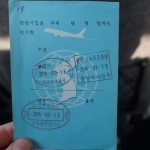
“Independence: A place that allows you to feel free”
Leaving The DPRK
We don’t often associate freedom with China; an authoritarian one party state which heavily censors the internet and the press, and highly restricts civil liberties. China is not a very free country. Yet for me, arriving there in mid-February of 2014, it was the freest I had felt in over a week. I had just arrived back from The Democratic People’s Republic of Korea.
I went on a tour with a great company and had a wonderful eye opening experience. When we take tours while travelling we are aware that we aren’t actually free to do exactly what we want. This is the attraction, everything is organised and pre-planned and we can just relax and enjoy the freedom of being led. Usually, regardless of where you are touring, there are restrictions, schedules to follow, buses to take, places to be, and The DPRK is no exception. The exception on this tour was not having the liberty to express my true feelings about what I was seeing in the country.
Once our train had crossed the border back into China, the first thing I said to my fellow travelers was “well, that was a bit mental.” Their sentiments followed suit. We hadn’t been able to express our opinions very openly for the duration of the trip. Yeah, I could talk to my husband in our hotel room, or have a sneaky chat with some people on the group, but it was risky. Not risky in the sense that we would have been arrested, but we couldn’t ostracize our tour guides. They were nice people, living in the most restricted, and perhaps, volatile country in the world. For us to speak badly of The DPRK or it’s leaders would have ruined our working relationships, and potentially gotten us all in trouble, so we stayed mum.
The first thing I did, in free China, was eat fast food. No Joke. Upon arriving in Dandong, a large city of the border of The DPRK, I went to KFC. Not because the chain represents capitalism, commerce, and globalization, but because I had the freedom to choose what I wanted to eat. I went online to tell my family back in Ireland that all was well. I walked down the street alone without a guide because I could.
While in The DPRK my husband and I used predetermined code words to express feelings of misgiving. To be specific, the code words were Peyton Mannings play calls, Omaha, buffalo and hot dog. We would use these fairly often and combine them to show levels of shock or just general craziness. For example, “have you ever seen a buffalo eating a hot dog in Omaha?” showed the utmost level level of discomfort and confusion. This was used both in the mausoleum of Kim Jong Il and on a postcard we sent to ourselves which took 10 weeks to reach Bangkok. There were quite a few occasions when we used the code words to converse without realizing one of the guides was behind us.
On our tour, we weren’t free to leave the group, go off on our own, or express our opinions openly. But we were free to leave the country, and that’s a freedom that most North Koreans do not have. After the week was up, we could leave. We could go home and use the internet. We could travel anywhere we wanted. We could earn a wage. We could buy products from all over the world, receive post, vote, protest, read international publications, write travel articles, and even enter competitions.
What traveling to North Korea taught me was that I am free. I am bound by relationships, monetary commitments and red tape, but essentially I can go anywhere and I can do anything within legal parameters. My trip to North Korea reminded me just how free I actually am, and the place that allows me to feel free is anywhere but The DPRK.
About the Author:
My name is Laura Mellor. I live in Bangkok, Thailand, and I haven’t been back to my native city of Dublin, Ireland, in 15 months. This is because I prioritize travel. Any chance I get, I go somewhere I haven’t been. I work as an English teacher, which I enjoy but my real passion, my real love, is travel. I have recently started a travel blog and hope to entertain and enlighten people with tales from my trips and through my expat observations.
Thank you for reading and commenting. Please enter the Independence Travel Writing competition and tell your story.
The post Leaving The DPRK appeared first on We Said Go Travel.
We Said Go Travel
We Said Go Travel is a global community of over sixteen hundred writers with articles from every continent.
Stories are shared with photos and video from a perspective of the transformative power of travel. We Said Go Travel has hosted live and online events as well as travel writing contests around the world. ...more
- Lisa Niver's profile
- 57 followers



